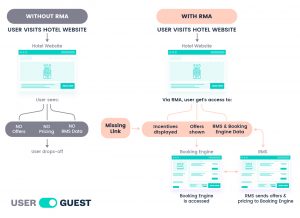In many hotel businesses, revenue and marketing teams still work in silos, separately from one another and in some cases unaware of the initiatives each team is focusing on. This gap has become an industry-wide concern as it directly impacts the hoteliers bottom line.
Recently we’ve seen a shift in roles where the responsibilities of revenue management and marketing have merged, known as the “commercial director”. This is an attempt to “marry the two” which makes sense, but not all hotels can or will appoint a commercial director. However, the challenge of harmonizing revenue and marketing on an executional level remains.
Hotel tech specialist Userguest is revolutionizing the way hotels can solve this challenge: by introducing a new concept known as RevMarketing Automation for hotels.
RevMarketing Automation (RMA) is a practical and logical evolution in hotel tech.
RMA is designed to help close this gap by empowering revenue and marketing collectively through intelligent automation. By combining the efforts of the hotel revenue manager and the marketing team, RMA helps to align goals and strategies between the two. The solution is not about replacing marketing teams or revenue managers but enabling these teams to work better and smarter together.
Both roles are clearly understood, so what’s the missing link?
Whilst putting revenue strategies together is an important job, once these are in place, a widespread problem occurs: These strategies are not always presented to the end-user! And in some cases, they are not leveraged enough to bring real value to the user and/or hotel due to limited digital touchpoints.
Why RevMarketing Automation is necessary.
Revenue management systems (RMS) are not connected to the hotel website, they are primarily connected to the booking engine, directly or via the PMS. Typically the guest will land on a hotel website (arriving from various traffic sources) and if they like what they see the booking process starts. Unfortunately this only happens 20% of the time for many hotels. In most cases, 80% of hotel website traffic will drop off at this point and continue their search elsewhere. This happens for multiple reasons, but website performance and user experience are significant factors.
So here’s the catch, at this critical first digital touchpoint the user wasn’t presented with any type of persuasion or incentive to book. All the pricing strategies carefully developed by the revenue team went by the wayside. All because the user never made it to the booking engine.
The end-user only lands on the booking engine once information regarding dates has been entered. This is where revenue strategies (offers, pricing, incentives) finally become visible.
The impact of potentially 80% of website traffic not being influenced at the crucial website stage is a huge loss, meaning hoteliers are missing the opportunity to convert users with the right offer 8 out of 10 times! This missed opportunity in user engagement is essential for successful marketing initiatives and website performance.
Without having access to data through the RMS, it becomes very hard to optimize marketing campaigns and convince the traffic landing on the hotel website to complete a booking. Marketing investments are in many cases inefficient due to:
- Not knowing if there are any rooms to sell during that period
- Sending users to dates that are not available
- Not providing incentives/offers to markets that are the most profitable
So how do we fix this problem? How can revenue strategies be more effective directly on the hotel website?
This is where RMA can help, by implementing smart revenue strategies directly on the hotel website, allowing revenue and marketing to align by pushing these strategies out to the user and engaging them.
How RevMarketing Automation does this.
A data-first approach: by collecting and interpreting valuable hotel website data and using those insights more effectively.
This means when a hotel website + the booking engine + the hotel PMS are connected via RMA, the user’s booking behaviors, demand trends and the hotel’s inventory goals are perfectly aligned – just the way they should be.
The benefits of RevMarketing Automation.
In practice, RMA is about identifying a revenue opportunity based on the hotel’s own data and using marketing techniques coupled with revenue strategies to influence users towards a desired outcome.
RMA strategies can be used to overcome many challenges that hotels face daily. Multiple strategies can be applied depending on the hotel’s specific needs and objectives and some examples include:
- Boosting low occupancy periods
- Upselling during high demand periods
- Boosting demand for specific days of the week
- Influencing longer lengths of stay
In summary RevMarketing Automation’s purpose is to; increase revenue for the hotel, increase occupancy where needed, improve Average Daily Rates, extend booking lengths of stay, and sell higher category rooms, in line with the hotel’s strategy.
How to implement RevMarketing Automation on a hotel website:
RMA is a concept that has been developed by hotel tech specialist Userguest. By adding Userguest’s technology to a hotel website, the tool automatically applies the RMA concept – matching a user’s booking intent with the hotel’s inventory priorities. Ultimately, unlocking the hotel website and allowing revenue and occupancy to be driven through automated offers and incentives.
Want to try RMA on your hotel website? Contact-us for a free demo and trial today!
